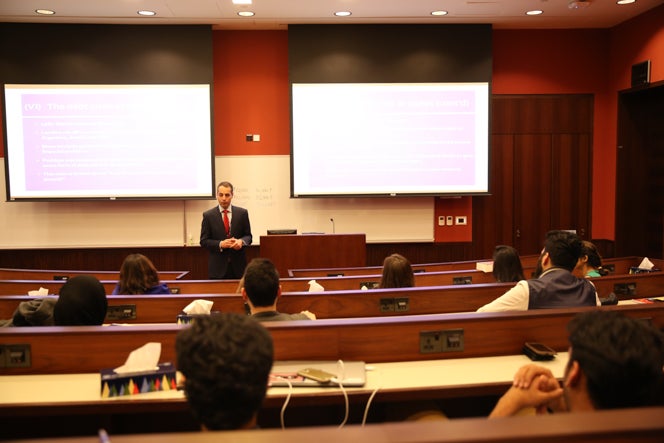Georgetown Summer Session Gives Students an Academic Advantage

For most university students, the end of the academic year means a break from books and the chance to kick back and relax with family and friends. But with almost 80 students enrolled in their summer term, including 5 cross-registered from other Education City universities, Georgetown University in Qatar (GU-Q) proves that many driven students prefer earning valuable course credit to a vacation.
For Sara Gadelmoula, a third year STEM student, the option to earn college credit from one of the other world leading campuses at Education City is a valuable one. “Cross registration provides me with direct access to academic resources in any subject matter,” she said. “That translates into a better quality education overall.”
The theology course she’s taking fulfills her elective requirement, but it has also given her a taste of the classroom experience at Georgetown. Unlike academic work in the hard sciences, Sara says the international affairs curriculum allows her “to be critical and sometimes argumentative which is an opportunity I hardly get as an engineer doing mostly scientific classes.”
The summer session of GU-Q’s academic year runs from May 19 to June 27, 2019. With daily classes held five days a week for an hour and a half, the summer term packs the classroom hours of a standard academic term into 6 intense weeks.
Thani Al-Thani, a communications major at NU-Q, cross-registered for GU-Q’s Formal Spoken Arabic course to improve his Arabic language fluency, a required skill for his future career plans.
Cross-registration, he says, “is an ideal way for students to enhance their learning by choosing their desired classes from institutions that specialize in their fields of interest.”
The summer students are enrolled in one or more of the seven classes on offer, taught by GU-Q’s world-renowned faculty. Courses range from Arabic language through economics and politics to theology, and nearly a third of the attending students are enrolled in two courses. All summer courses earn students college credit.